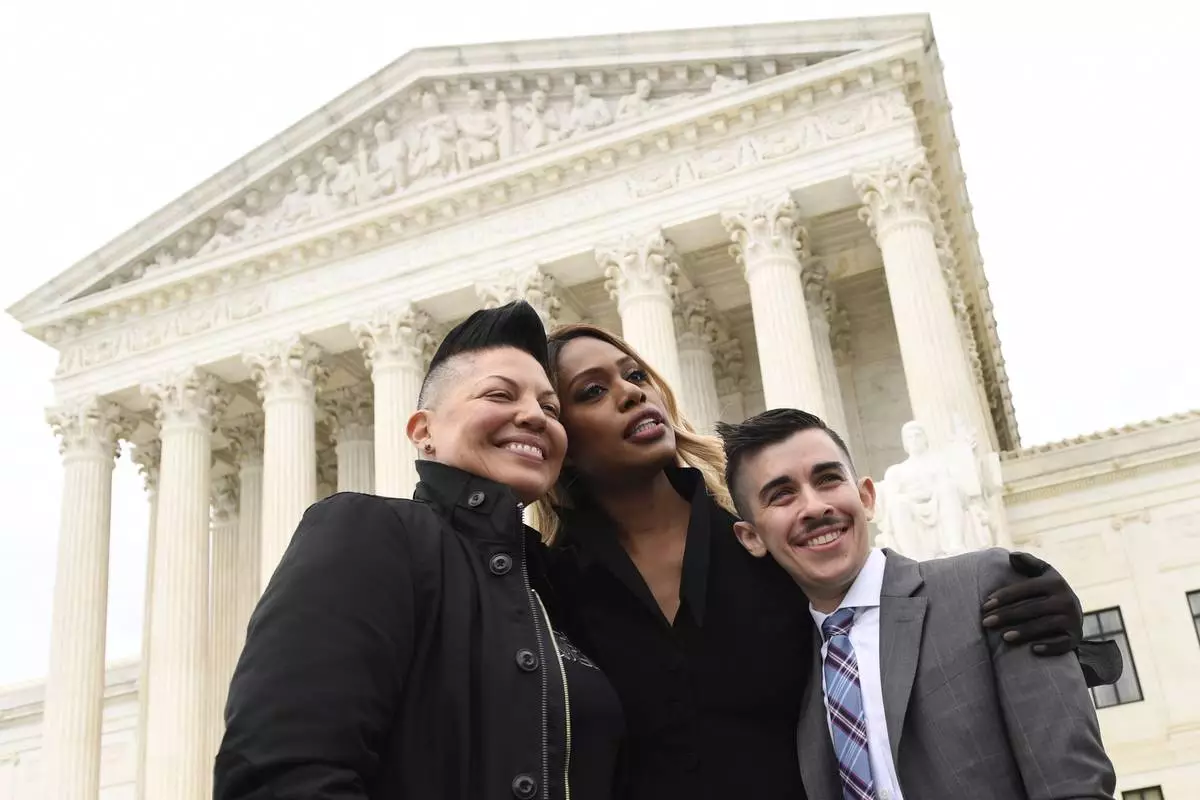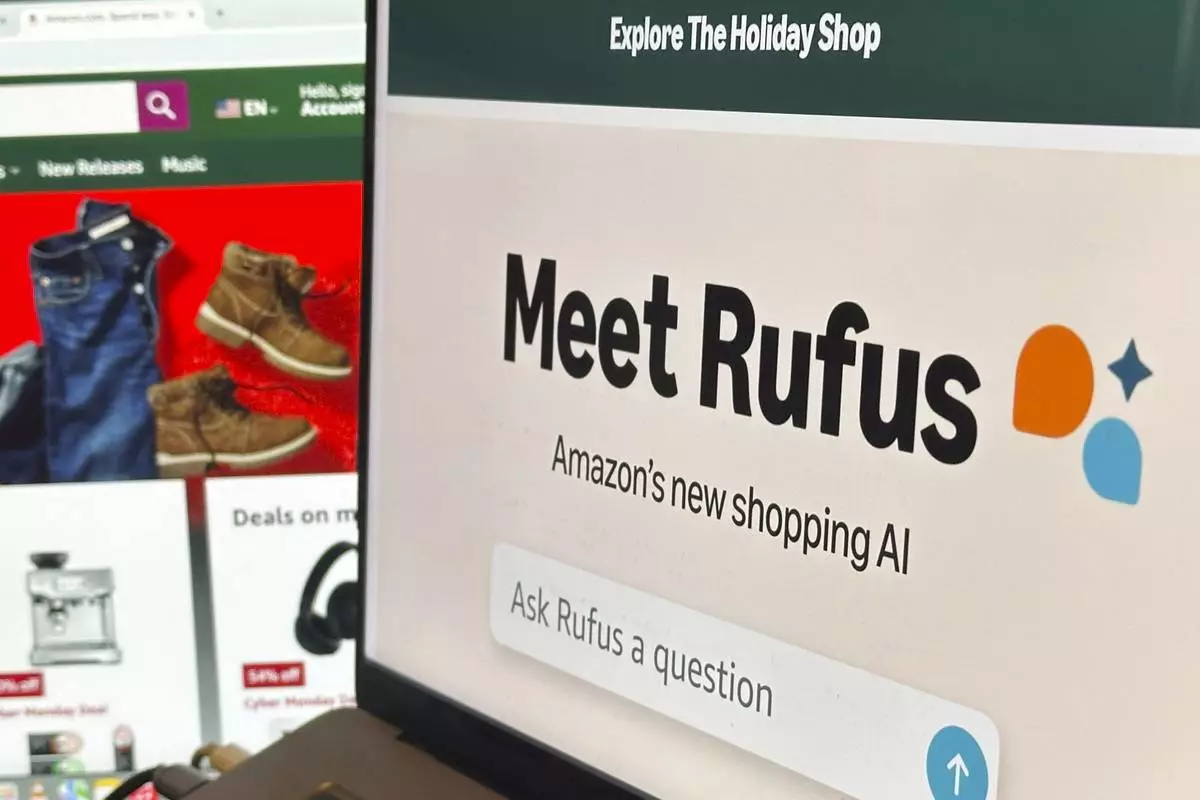WASHINGTON (AP) — When the Supreme Court this week wades into the contentious issue of transgender rights, the justices will hear from an attorney with knowledge that runs deep.
Chase Strangio will be the first openly transgender attorney to argue before the nation's highest court, representing families who say Tennessee’s ban on health care for transgender minors leaves their children terrified about the future.
Arguments in the case come amid heightened pushback to transgender rights, including a presidential campaign where Republican Donald Trump put his fierce opposition front and center.
Strangio will bring months of intense legal preparation to the case as well as hard-won lessons from his own experience.
“I am able to do my job because I have had this health care that transformed and, frankly, saved my life,” he said. “I am a testament to the fact that we live among everyone.”
Strangio grew up outside of Boston and came out as trans when he was in law school. Now 42, he's an American Civil Liberties Union attorney whose legal career has included representing former Army intelligence analyst Chelsea Manning, challenging a ban on transgender people serving in the military and helping win an LGBTQ+ worker-discrimination case at the Supreme Court. He's also the father of a 12-year-old, the son of a father who supports Trump, and has a close relationship with his Army-veteran brother.
He's also an advocate, speaking out as a series of U.S. states banned gender-affirming health care for transgender minors. The laws are part of a wave of restrictions on school sports participation and bathroom usage around the country. After the first openly transgender person was elected to Congress, House Speaker Mike Johnson, R-La., declared support for restricting bathroom use to sex assigned at birth.
Tennessee, meanwhile, will argue before the Supreme Court that treatments like puberty blockers and hormones carry risks for young people and its law protects them from making treatment decisions prematurely.
“Tennessee, like many other states, acted to ensure that minors do not receive these treatments until they can fully understand the lifelong consequences or until the science is developed to the point that Tennessee might take a different view of their efficacy,” state attorneys wrote in court filings.
Arguing for Tennessee is state Solicitor General Matt Rice. He served in 2019 as a clerk for Justice Clarence Thomas, who dissented from the transgender worker-discrimination case Strangio worked on that term. The state attorney general's office did not make Rice available for an interview ahead of arguments, but his background also includes a couple of years as a minor league baseball player for the Tampa Bay Rays before he earned his law degree from the University of California, Berkeley.
The Biden administration is supporting the challenge to Tennessee's law, but the federal government’s position is expected to change after Trump takes office in January. Strangio said he'll nevertheless keep advocating for transgender youth to access health care that wasn't available when he was young.
“Many of us think about our childhood and young adulthood as lost years, when we were just simply disembodied from our core,” he said. Major medical groups, including the American Medical Association and the American Academy of Pediatrics, oppose the bans and have endorsed such care, saying it’s safe when administered properly. Strangio also pointed out that many medical interventions for young people, like gastric bypass surgeries for weight loss, carry some risk and it makes sense to inform families and let them decide.
“There is harm that is compounded when we are forcing young people to be denied care that their doctors and their parents and they themselves all agree they need,” he said.
The Supreme Court is expected to decide the case by the summer.
Associated Press writer Mark Sherman contributed to this report.

FILE - ACLU attorney Chase Strangio, right, and actor Elliot Page leave the 8th U.S. Circuit Court of Appeals after a hearing, April 11, 2024, in St. Louis. (AP Photo/Jim Salter, File)

FILE - Sara Ramirez, from left, Laverne Cox and Chase Strangio, an attorney with the American Civil Liberties Union, pose for a photo outside the Supreme Court in Washington, Oct. 8, 2019. (AP Photo/Susan Walsh, File)

FILE - ACLU lawyer Chase Strangio, left, and plaintiff Joaquin Carcano address reporters after a hearing, June 25, 2018, in Winston-Salem, N.C., on their lawsuit challenging the law that replaced North Carolina's "bathroom bill." Carcano and other transgender plaintiffs argue the new law continues to discourage transgender people from using restrooms that match their gender identity. (AP Photo/Jonathan Drew, File)
Tired of thinking about what gifts to get everyone this year? Artificial intelligence chatbots might help, but don't expect them to do all the work or always give you the right answers.
Anyone scouring the internet for Cyber Monday deals is likely going to encounter more conversational iterations of the chatbots that some retailers and e-commerce sites have built to provide shoppers with enhanced customer service.
Some companies have integrated models infused with newer generative AI technologies, allowing shoppers to seek advice by asking naturally phrased questions like “What's the best wireless speaker?”
Retailers hope consumers use these chatbots, which are typically called shopping assistants - as virtual companions that help them discover or compare products. Prior chatbots were mostly used for task-oriented functions such as helping customers track down online orders or return ones that didn't meet expectations.
Amazon, the king of online retail, has said its customers have been questioning Rufus - the generative AI- powered shopping assistant it launched this year - for information such as whether a specific coffee maker is easy to clean, or what recommendations it has for a lawn game for a child's birthday party.
And Rufus, which is available for holiday shoppers in the U.S. and some other countries, is not the only shopping assistant out there. A select number of Walmart shoppers will have access this year to a similar chatbot the nation's largest retailer is testing in a few product categories, including toys and electronics.
Perplexity AI added something new to the AI chat-shopping world last month by rolling out a feature on its AI-powered search engine that enables users to ask a question like “What's the best women's leather boots?" and then receive specific product results that the San Francisco-based company says are not sponsored.
“It has been adopted at pretty incredible scale,” Mike Mallazzo, an analyst and writer at retail research media company Future Commerce, said.
Retailers with websites and e-commerce companies started paying more attention to chatbots when use of ChatGPT, an artificial intelligence text chatbot made by the company OpenAI, went mainstream in late 2022, sparking public and business interest in the generative AI technology that powers the tool.
Victoria’s Secret, IKEA, Instacart and the Canadian retailer Ssense are among other companies experimenting with chatbots, some of which use technology from OpenAI.
Even before the improved chatbots, online retailers were creating product recommendations based on a customer's prior purchases or search history. Amazon was at the forefront of having recommendations on its platform, so Rufus' ability to provide some is not particularly groundbreaking.
But Rajiv Mehta, the vice president of search and conversational shopping at Amazon, said the company is able to offer more helpful recommendations now by programming Rufus to ask clarifying or follow-up questions. Customers are also using Rufus to look for deals, some of which are personalized, Mehta said.
To be sure, chatbots are prone to hallucinations, so Rufus and most of the tools like it can get things wrong.
Juozas Kaziukenas, founder of e-commerce intelligence firm Marketplace Pulse, wrote in a November blog post that his firm tested Rufus by requesting gaming TV recommendations. The chatbot's response included products that were not TVs. When asked for the least expensive options, Rufus came back with suggestions that weren't the cheapest, Kaziukenas said.
An Associated Press reporter recently asked Rufus to give some gift recommendations for a brother. The chatbot quickly spit out a few ideas for “thoughtful gifts," ranging from a T-shirt and a keychain with charms to a bolder suggestion: a multifunctional knife engraved with the phrase “BEST BROTHER EVER.”
After a 5-minute written conversation, Rufus offered more tailored suggestions - a few Barcelona soccer jerseys sold by third-party sellers. But it wasn’t able to say which seller offered the lowest price. When asked during another search for a price comparison on a popular skin serum, Rufus showed the product's pre-discounted price instead of its present one.
“Rufus is constantly learning,” Amazon's Mehta said during an interview.
Shop AI, a chatbot that Canadian e-commerce company Shopify launched last year, can also help shoppers discover new products by asking its own questions, such as soliciting details about an intended gift recipient or features the buyer wants to avoid. Shop AI has trouble, however, recommending specific products or identifying the lowest-priced item in a product category.
The limitations show the technology is still in its infancy and has a long way to go before it becomes as useful as the retail industry - and many shoppers - wish it could be.
To truly transform the shopping experience, shopping assistants will “need to be deeply personalized” and be able - on their own - to remember a customer’s order history, product preferences and purchasing habits, consulting giant McKinsey & Company said in an August report.
Amazon has noted that Rufus' answers are based on information contained in product listings, community Q&As and customer reviews, which would include the fake reviews that are used to boost or diminish sales for products on its marketplace.
The large language model that powers the chatbot was also trained on the company's entire catalog and some public information on the web, Trishul Chilimbi, an Amazon vice president who oversees AI research, wrote in the electrical engineering magazine IEEE Spectrum in October.
But its unclear how Amazon and other companies are weighting different training components - such as reviews - in their recommendations, or how exactly the shopping assistants come up with them, according to Nicole Greene, an analyst at management consulting firm Gartner.
Perplexity AI's new shopping feature allows users to enter search queries such as “best phone case" and to receive answers derived from various sources, including Amazon and other retailers, such as Best Buy. Perplexity also invited retailers to share data about their products and said those that do would have an increased chance of having their items recommended to shoppers.
But Perplexity CEO Aravind Srinivas, suggested in a recent interview with Fortune magazine that he didn't know how the new shopping feature recommended products to customers. But in an interview with the AP, Chief Business Officer Dmitry Shevelenko pushed back on that characterization, saying Srinivas' comment “was probably taken out of context.”
The context, he said, is that with generative AI technology “You can’t know in advance exactly what the output will be just based off of knowing what the inputs” are from the training materials.
Shevelenko said retailers and brands need to know they can't have their products recommended in Perplexity's search engine because they're “jamming key words” into their websites or using different techniques to show up better on search results
“The way you show up in an answer is by having a better product and better features,” he said.

Amazon's generative AI-powered shopping assistant, known as Rufus, appears on a computer monitor in this photo taken on Dec. 1, 2024, in New York. (AP Photo/Peter Morgan)













